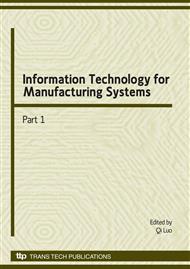[1]
Gaurav Bhatnagar, Shikha Mehta and Sugata Mitra, Introduction to Multimedia Systems, Elsevier, (2004).
Google Scholar
[2]
Jerry D. Gibson, Multimedia Communications, Academic Press, (2001).
Google Scholar
[3]
Philip A. Chou and Mihaela van der Schaar, Multimedia over IP and Wireless Networks, Academic Press, (2007).
Google Scholar
[4]
Rogelio Martínez Perea, Internet Multimedia Communications Using SIP, Morgan Kauffman, (2008).
Google Scholar
[5]
D.R. Bull, C.N. Canagarajah and A.R. Nix, Insights Into Mobile Multimedia Communications, Morgan Kauffman, (1999).
Google Scholar
[6]
Ansgar Scherp, Canonical processes for creating personalized semantically rich multimedia presentations, Multimedia Systems. 14(6) (2008) 415 - 425.
DOI: 10.1007/s00530-008-0139-8
Google Scholar
[7]
W. Tavanapong and J. Zhou, Shot clustering techniques for story browsing, IEEE Trans. Multimedia. 6 (2004) 517-527.
DOI: 10.1109/tmm.2004.830810
Google Scholar
[8]
P. Aigrain, P. Joly and V. Longueville, Medium knowledge-based macrosegmentation of video into sequences, Intelligent Multimedia Information Retrieval. (1997)159-173.
Google Scholar
[9]
Wenjun Zeng, Heather Yu and Ching-Yung Lin, Multimedia Security Technologies for Digital Rights Management, Academic Press, (2006).
Google Scholar
[10]
Kevin Jeffay and HongJiang Zhang, Readings in Multimedia Computing and Networking, Morgan Kauffman, (2002).
Google Scholar
[11]
Mladen Victor Wickerhauser, Mathematics for Multimedia, Elsevier, (2004).
Google Scholar
[12]
Lynda Hardman, Željko Obrenović, Frank Nack, Brigitte Kerhervé and Kurt Piersol, Canonical processes of semantically annotated media production, Multimedia Systems. 14(6)(2008) 327-340.
DOI: 10.1007/s00530-008-0134-0
Google Scholar
[13]
Z. Rasheed and M. Shah, Detection and representation of scenes in videos, IEEE Trans. Multimedia. 7(2005)1097-1105.
DOI: 10.1109/tmm.2005.858392
Google Scholar
[14]
Y. Rui, T. S. Huang and S. Mehrotra, Constructing table of content for videos, Multimedia Systems. 7(1999) 359-368.
DOI: 10.1007/s005300050138
Google Scholar
[15]
Y. Zhai and M. Shah, Video scene segmentation using Markov chain Monte Carlo, IEEE Trans. Multimedia, 8(2006)686-697.
DOI: 10.1109/tmm.2006.876299
Google Scholar
[16]
Mehrdad Hosseini Zadeh, David Wang and Eric Kubica, Perception-based lossy haptic compression considerations for velocity-based interactions, Multimedia Systems, 13(4)(2008)275 - 282.
DOI: 10.1007/s00530-007-0106-9
Google Scholar
[17]
Bruce Fette, Cognitive Radio Technology, Newnes, (2006).
Google Scholar
[18]
Ian Poole, Radio and Communications Technology, Newnes, (2003).
Google Scholar
[19]
David Bailey, Practical Radio Engineering and Telemetry for Industry, Newnes, (2003).
Google Scholar
[20]
Joseph J. Carr, The Technician's Radio Receiver Handbook, Newnes, (2000).
Google Scholar
[21]
Norman Dye and Helge Granberg, Radio Frequency Transistors, Second edition, Newnes, (2001).
Google Scholar
[22]
Jiemin Zhao, On the superharmonic resonance problems, Journal of Hefei University of technology, 28(12)(2005) 1618-1620.
Google Scholar


